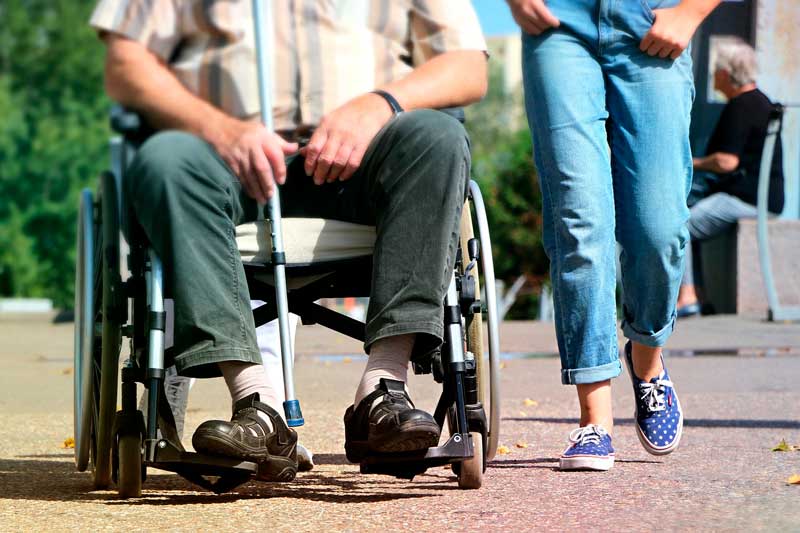Support measures for people with disabilities
Today, people with disabilities have the right to make their own decisions.
On June 3, 2021, Law 8/2021 of June 2 was published and came into force on September 3, 2021, reforming, among other regulations, the Law of Notaries, the Civil Code, the Mortgage Law, the Civil Procedure Law, the Civil Registry, the Law of Voluntary Jurisdiction and the Commercial Code. The most substantial reform is that of the Civil Code, since it establishes the basis for a new system based on respect for the will and preferences of persons with disabilities, and whose Title XI of Book One is now called “On measures to support persons with disabilities in the exercise of their legal capacity”. This reform has been the adaptation of our legal system to the International Convention on the Rights of Persons with Disabilities, made in New York on December 13, 2006.
Article 1 of the international treaty has a very clear purpose:
“The purpose of the present Convention is to promote, protect and ensure the full and equal enjoyment of all human rights and fundamental freedoms by all persons with disabilities, and to promote respect for their inherent dignity.
Persons with disabilities include those who have long-term physical, mental, intellectual or sensory impairments which, in interaction with various barriers, may hinder their full and effective participation in society on an equal basis with others.”

Article 12 proclaims that persons with disabilities have legal capacity on an equal basis with others in all aspects of life, and obliges States Parties to take appropriate measures to provide persons with disabilities access to the support they may need in exercising their legal capacity.
Law 8/2021, of June 2, which reforms civil and procedural legislation to support persons with disabilities in the exercise of their legal capacity, introduces a new chapter II bis to Title II of the LJV, “On the file for the provision of judicial measures of support for persons with disabilities”, covering articles 42 bis a) to 42 bis c), with entry into force on 03/09/2021.
When the provision of any judicial support measure of a stable nature to a person with a disability is relevant, which will be subject to periodic review, the procedures provided for in Law 15/2015, of July 2, on Voluntary Jurisdiction, articles 42 bis a) to 42 bis c) will be followed. In the event of opposition of the person with disability to any type of support, opposition of the Public Prosecutor’s Office or opposition of any of the interested parties to the adoption of the requested support measures, the Voluntary Jurisdiction file will be terminated, without prejudice to the possibility of subsequently filing, already in a contentious trial, a lawsuit for the adoption of support measures.
The procedure has recently changed in an attempt to adapt especially to the wishes of the person concerned.
The judicial procedure can only lead to a resolution that determines the acts for which the disabled person requires support, but in no case to a declaration of incapacitation or, much less, to the deprivation of rights, whether personal, patrimonial or political.
What we used to know as a process of modification of capacity by declaring a person incapable, or even the deprivation of rights (personal, patrimonial or political) no longer exists, these terms are abandoned and replaced by a new terminology, by the reference to providing support to persons with disabilities in the exercise of their legal capacity. The general representative function is excluded, and only in those necessary situations, and exceptionally, could be attributed. It is committed to the autonomy of will, respect for inherent dignity and legal capacity on equal terms, respecting all human rights and fundamental freedoms.
A new system of autonomy for adults or emancipated minors affected by disability is promoted, in which equality of conditions prevails, and they themselves can voluntarily provide them, acquiring importance the preventive powers and mandates and even being possible the self-guardianship.
The figure of de facto guardianship is strengthened, which is transformed into a legal institution of support, as it is no longer a provisional situation when it is sufficient and adequate to safeguard the rights of the person with disabilities; and prodigality is abolished as an autonomous institution.
On the other hand, the figure of the legal defender is also included, foreseen for certain types of situations, for example, when there is a conflict of interest between the support figure and the person with a disability, or when it is temporarily impossible for the usual support figure to provide it.
Only in cases where there can be no will, the measures may have a regulatory or judicial origin. In the cases of support measures of judicial origin, it becomes the curatorship (a care of assistance nature, of support and help), leaving aside, as mentioned before, the representative nature of the guardianship (the extended parental authority and the rehabilitated parental authority are also eliminated) which will be exclusively reserved for minors who are not protected through parental authority, who once they reach the age of majority will be treated in the same way as any adult, providing them with all the support they need. In the complement of capacity required by the emancipated for the exercise of certain legal acts will be attended by a judicial defender.
The terminology of incapacitation of those who do not consider themselves sufficiently capable is eliminated, as well as the modification, strictly speaking, of a capacity which is inherent in the simple fact of being human beings.
